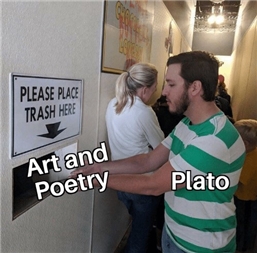Plague Journal, Another Dangerous Poet
Plato was not a fan of the tragedians, or of the work of any poet. The view of Plato, that reason will lead us to an epiphany of “the good”, if we discipline ourselves enough, — is precisely the idealism which is central to our Enlightenment heritage, here in this United States of America. At this juncture I expect you are hearing a small voice within persistently asking, “So, how is that working out for us?’ That is the question we need to keep asking.
I came across this poem yesterday.
Hypothesis
By Paul Tran
Whether it’s true
that the moth mistakes the candle’s flame
for the moon or the bioluminescent
pheromones of another moth,
I can’t say.
I was the candle.
I was the flame
conceived in and by reason of
darkness, nibbling on a darkening wick.
When moth after moth after moth
swarmed me with their powdery wings,
I asked why.
I asked how.
I asked if
I could survive knowing
that not everything has a reason,
that not everything is capable
of or interested in reason.
Nothing answered.
Nothing spoke
my language of smoke.
“Every poem, for me, begins with a question I don’t have the answer to, and here, in ‘Hypothesis,’ the question is whether I could persist in a world where things—love, violence, pleasure, pain, joy, agony—occur at random. I didn’t think I could; I thought there had to be a reason for suffering, that my suffering made me special, but in writing this poem, I found that I suffer because I want my suffering to mean something. Pain is pain, the poet Randall Jarrell tells me, and I’m trying—I really am trying—to see the world for what it is and not what my heart needs it to be.”
—Paul Tran
 I well understand why Plato feared poetry, believed it was subversive, apt to undermine the logic of reason so necessary for our survival. Nothing less than survival are the stakes at issue. Was Plato right? He was right and he was wrong. Reason is more than important, reason is essential for an ethical life. There is a caveat, a caution to keep in mind. At the heart of our being, something having nothing to do with reason wells up when I encounter beauty in a tiny flower, or the Grand Canyon carved over eons by the Colorado River. “That” is seeing the world for what it is.
I well understand why Plato feared poetry, believed it was subversive, apt to undermine the logic of reason so necessary for our survival. Nothing less than survival are the stakes at issue. Was Plato right? He was right and he was wrong. Reason is more than important, reason is essential for an ethical life. There is a caveat, a caution to keep in mind. At the heart of our being, something having nothing to do with reason wells up when I encounter beauty in a tiny flower, or the Grand Canyon carved over eons by the Colorado River. “That” is seeing the world for what it is.
In order to daily receive via email a new poem by a contemporary poet, CLICK HERE.